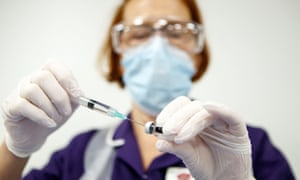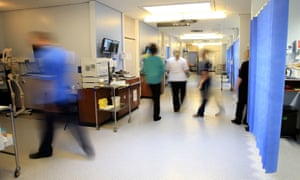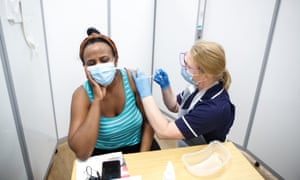
Thailand recorded 3,065 foreign tourists in November, its second month of receiving long-stay visitors after a ban was imposed in April to reduce the spread of coronavirus.
The figure is a fraction of the 3.39 million arrivals in the same period last year. In October, there were 1,201 foreign visitors.
In the January-November period, the number of foreign visitors slumped by 81% from a year earlier.
Cabinet Office minister Michael Gove has not ruled out the whole of England being moved into Tier 4 restrictions.
“We review which tiers parts of the country should be in on the basis of scientific evidence.
“The Joint Biosecurity Centre (JBC) will be making a recommendation to ministers, but I can’t pre-empt that because it obviously has to be a judgment based on the medical situation,” he said. “As you quite rightly point out, the NHS is under pressure and these are difficult months ahead.”

Nurse Pat Sugden prepares the Pfizer-BioNTech vaccine at the Thackray Museum of Medicine in Leeds, the first UK museum to host a Covid-19 vaccination centre, on 22 December 2020. Photograph: Danny Lawson/PA
However, he said that the UK should be able to lift some coronavirus restrictions when the Oxford/AstraZeneca vaccine is rolled out.
Gove said that the independent regulator had to assess the vaccine, but if it was approved there would be a “significant increase” in vaccine available. Britain is already rolling out a vaccine developed by Pfizer and BioNTech.
“If we do get the authorization for that vaccine, and the rollout goes according to plan, then we will be able to progressively lift some of the restrictions, which have made life so difficult for so many,” he told Sky News.
Indonesia to ban foreign travellers for two weeks
Indonesia is set to ban international visitors for two weeks, beginning on 1 January.
Foreign minister Retno Marsudi announced the ban, citing concerns around the new strains of coronavirus. So far, the two most alarming strains are currently spreading in England and South Africa.
The new regulation applies to all foreign visitors with the exception of high-level government officials, Marsudi said.
The announcement comes days after Indonesia banned travellers from the Britain and tightened rules for those arriving from Europe and Australia to limit the spread of the new strain. Indonesia banned all tourists earlier this year, but some exemptions have been made for business travellers.
Updated
at 4.32am EST
England is still planning a staggered return for secondary school pupils after the Christmas holidays, but this may change following the spread of a new variant of coronavirus in England, cabinet minister Michael Gove has said.
The current plan is for students taking GCSEs and A-levels this year, alongside the children of key workers, to return to school next week, with other secondary school students returning the week after. However, Gove suggested this could be changed.
“We do keep things under review, and we’ll be talking to head teachers and teachers in the next 24, 48 hours just to make sure that our plans… are really robust,” he told Times Radio.
Updated
at 4.34am EST
The president of the Royal College of Emergency Medicine in the UK has said hospitals were “wall to wall” with Covid-19 patients on Christmas Day.
“We see patients who are coming in who have Covid symptoms and then we have other people coming in with other symptoms who turn out to be Covid positive,” Dr Katherine Henderson told BBC Breakfast. “Between that, there’s a great deal of difficulty getting those patients through into the wards.”
Henderson said she thought that the NHS would be able to cope with the increased pressure, but that it would come at a “cost” – “the cost is not …being able to keep non-Covid activities going”.

Dr Katherine Henderson said that coping with the coronavirus pandemic meant the NHS would have to delay treatment for other patients. Photograph: Peter Byrne/PA
Henderson said that the health service was experiencing staff shortages, with many off sick or isolating, but insisted the NHS would “stretch staff” with measures including double shifts and bringing people to work during their annual leave.
She also said there would be a “big” delay before the impact of tier 4 restrictions would be felt in the NHS.
“All the people we are seeing at the moment were infected two weeks ago,” she said.
Henderson also implored people not to “take a chance” on New Year, saying “it’s incredibly important that we don’t get another surge”.
Updated
at 4.30am EST
The president of the Royal College of Physicians and Surgeons of Glasgow has warned that there will be a “cost” for allowing household mixing on Christmas Day in Scotland.
“When there is increased mixing we know there is likely to be increased transmission, (Scotland’s) levels have never fallen to the kind of levels that we would have wished, so we are starting from a higher base,” Prof Jackie Taylor said on BBC Breakfast. “In addition, the new variant strain we are seeing does appear to be significantly more transmissible and that does give us great cause for concern, when we add that to the usual winter pressures we are really very anxious for the potential of a further huge surge of cases.”

Edinburgh, pictured here on Boxing Day, was almost deserted over Christmas. Mainland Scotland is now in level 4 – the toughest tier – and the islands have moved to level 3. Photograph: Jane Barlow/PA
However, Taylor did not condemn the Scottish government’s decision to relax the rules for a day during the festive season, saying that it was important to remember “how important it is for some people to have had the ability to be with family even for a short time”.
She also warned that non-urgent treatment in the NHS Scotland would have to delayed due to the pandemic.
“As healthcare professionals, we want to be able to treat everyone, we want to ensure everyone gets the best of care, but unless we get a grip of Covid and really get on top of this then we won’t be able to open up the other services again,” she said. “We have to focus on getting on top of the acute problems we have at the moment.”
Taylor urged people to avoid mixing with members of other households over new year, and to continue handwashing, social distancing and mask wearing.
Updated
at 4.33am EST
The Japanese prime minister, Yoshihide Suga, has told his ministers to stay ready to implement further coronavirus restrictions, after the number of daily cases hit record highs in recent days.
“The virus recognises no year-end or new year holidays. I ask each minister to raise the level of their sense of urgency and thoroughly carry out counter measures,” Suga told a meeting of the government’s taskforce on coronavirus on Monday.
Updated
at 4.33am EST
GCSE and A-Level exams will “absolutely” go ahead next year in England, UK cabinet minister Michael Gove has said.
Gove said the exams were “critically important in making sure students have a chance to show what they’ve learnt and what their skills are” and gave them “robust, independently verified qualifications” which were a “passport to a better future”.
A-level exams will ‘absolutely’ go ahead in 2021, says Michael Gove – video
This differs dramatically from the rest of the UK:
In Scotland, higher and advanced higher exams will not go ahead, and will be replaced with teacher assessed grades based on evidence of the student’s attainment.
In Wales, there will be no end of year exams for those taking GCSE, AS level and A level qualifications approved by Qualifications Wales and delivered by WJEC in summer 2021.
Northern Ireland is set to reduce their exams, but not cancel them entirely.
Updated
at 4.38am EST
It is likely to be summer before herd immunity is reached through a coronavirus vaccine programme in the UK, respiratory disease expert Prof Calum Semple has said.
Semple said between 70% and 80% of the population needed to be vaccinated before herd immunity could be achieved.
Speaking to BBC Breakfast, Prof Semple said: “Obviously there is an urgency about this and we know that it is difficult to vaccinate lots of people at the same time – we’ve got a population of just under 70 million people and we’re going to move through them in an orderly fashion vaccinating people most at risk.”

Nurse Heather Ong (right) gives Frewyne Hadera the Pfizer-BioNTech vaccine at the Thackray Museum of Medicine in Leeds, the first UK museum to host a Covid-19 vaccination centre, on 22 December 2020. Photograph: Danny Lawson/PA
“The people that have been vaccinated will be protected within a matter of weeks and that’s very important,” he added. “On an individual basis these vaccines are so good that they will protect individuals, so we don’t have to wait for this nonsense about herd immunity developing through natural infection, we can start to protect the individuals.
“To get the wider community herd immunity from vaccination rather than through natural infection will take probably 70% to 80% of the population to be vaccinated, and that, I’m afraid, is going to take us right into the summer I expect.”
Updated
at 4.37am EST
Trump signs $900bn coronavirus relief package
Donald Trump has signed a $900bn coronavirus relief package to help the US economy recover from the pandemic, after threatening to reject the bill last week.
The aid package was agreed by Democrats and Republicans in Congress late last Sunday, after months of negotiations. But Trump unexpectedly demanded that the package, which had already been passed by the House and Senate and was believed to have Trump’s support, be revised to include larger relief checks and scaled-back spending on foreign aid.
What does the bill offer?
The aid package includes $286bn in direct economic relief, with more than half going on payments of $600 to individuals.
The US government will also restart pandemic unemployment benefits at $300 a week, which will last until 14 March. However, this is a drop in the amount offered from the $600 payments that expired in July.
It includes funding for businesses, the arts, and foreign aid.
You can read more about what it offers here:
Updated
at 4.44am EST

Molly Blackall
Hello everyone, I’m Molly Blackall. I’ll be bringing you the latest updates in the coronavirus pandemic in the UK and around the world over the next few hours.
If you spot something you think we should be reporting on in this blog, you can drop me a message on Twitter. Tips and pointers are always much appreciated, so thanks in advance!


